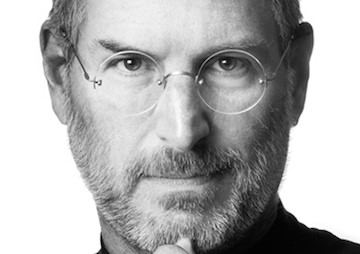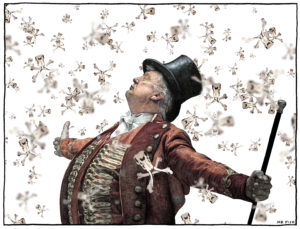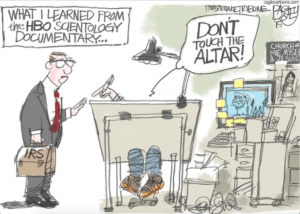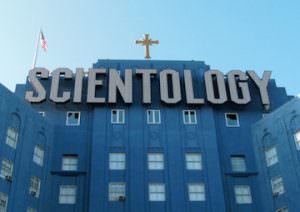Enough of This Nonsense About Steve Jobs Being an Artist
The triumph of Steve Jobs, Apple and tech in general was ushering in a new language of business. The iPhone is not a hand-held computer; it is an “extension of oneself.” And Jobs and his disciples are not merely businessmen and technicians but also “poets and artists.” Steve Jobs. (segagman / CC BY 2.0)
Steve Jobs. (segagman / CC BY 2.0)
The triumph of Steve Jobs, Apple and tech in general was ushering in a new language of business, writes Todd Kliman at The Washingtonian. The iPhone is not a hand-held computer; it is an “extension of oneself.” And Jobs and his disciples are not merely businessmen and technicians but also “poets and artists.”
Kliman’s observations come in a review of Academy Award-winning documentary filmmaker Alex Gibney’s new film, “Steve Jobs: The Man in the Machine.”
“A more insightful film would have situated the story of Jobs in the context of the American project,” Kliman continues, “and shown us that here, again, what looks to be new is not really new at all”:
One of the great lies of tech, and Jobs played a crucial role in perpetuating it, is to make us think that the business world of Silicon Valley is fundamentally different from the business world of old—that the makers of chips and processors and software and gadgets are here not simply to line their pockets and extract maximum profit; they are here to help us, improve us, save us, redeem us. These companies with their cheery, unimposing names (Apple, Google, Yahoo) are housed in clean and gleaming structures, a conspicuous and self-conscious contrast with the dirty factories of the ’20s or the forbiddingly monolithic headquarters of the ’60s. Workers don’t sweat or strain, and they are not faceless bureaucrats; they’re kids, and kids-at-heart, who are afforded ample space to play frisbee and daydream on sprawling, sun-dappled campuses. Their products are not impersonal, like light switches or toilets or TVs; they are, as Jobs had it and endlessly advertised it, personal. Jobs’s initial notion of a personal computer—a small machine for one, as opposed to an intractable machine that served multitudes—became, over time, the notion of a computer that itself was personal, that could be made to transcend (in ad copy, if not in fact) its being a mere tool. …
Being a maverick and an innovator in an industry does not make one an artist. It makes one a smart businessman. The serious artist and the successful businessman could not be more fundamentally different in their aims and approaches. The businessman endeavors to give us what we want, devoting hours upon hours to researching the various shifts in the marketplace and spending great gobs of money in the process. The serious artist, heeding an inner dictate, gives us what we don’t want—disturbing us, shaking us from our complacency, waking us up to the truth before our eyes. …
Jobs was the product of two strains in the culture. One is easy to identify—the rugged romanticism that continues to define the American self-image, even as the country has grown into a vast and mighty empire with de facto colonies spread across the globe. Jobs burnished its myth, as one of those cowboys of industry for whom we reserve our greatest rewards, a dreamer-schemer who sets out alone and doesn’t play nice and triumphs against all odds. The other is harder to see because, although the culture turns on money, it doesn’t take kindly to discussions or examinations of its sources. But you can draw a line from Jobs all the way back to the Puritan thinkers, who saw something almost holy in the accumulation of a vast wealth. Those who amassed great fortunes were endowed with something otherworldly. They were possessed of the divine, and therefore closer to God.
To Gibney’s credit, Kliman writes, near the end of the film he focuses on the aftermath of a fire that killed two employees at a Chinese factory that manufactures Apple products, “the unsafe and often abusive conditions under which the shiny toys of the First World are cranked out,” and Jobs’ punishment of a Gizmodo journalist who happened to obtain a prototype of an unreleased iPhone.
“The filmmaker wants us to be shocked—shocked—that Apple is responsible for such scandalously abhorrent behavior, and that the quintessential businessman of the age turns out to be just another businessman,” Kliman continues. “The shock is that the public was so credulous as to believe that a corporate behemoth and its leader were as clean and pure as they were portrayed.”
Read more here.
— Posted by Alexander Reed Kelly.
Your support matters…Independent journalism is under threat and overshadowed by heavily funded mainstream media.
You can help level the playing field. Become a member.
Your tax-deductible contribution keeps us digging beneath the headlines to give you thought-provoking, investigative reporting and analysis that unearths what's really happening- without compromise.
Give today to support our courageous, independent journalists.








You need to be a supporter to comment.
There are currently no responses to this article.
Be the first to respond.